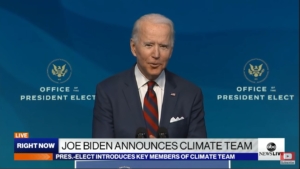Crown Prince and the Revolution, Leveling the Bureaucratic Playing Field, and Lattes for Litigation
Here’s What You Need To Know
Last week, Saudi Crown Prince Mohammed bin Salman, known as MBS, concluded his extensive three-week trip across the United States in which he met with politicians in D.C., business leaders and academics in Boston, tech titans in Silicon Valley, and more. While meetings with Jeff Bezos and Hollywood agent Ari Emanuel may have garnered media attention, MBS’s comments about Israelis’ “right to have their own land” have not gotten as much attention as they deserve. They are profoundly significant, as are the implications they have for the region at-large:
- What MBS Said: In a wide-ranging interview with Jeffrey Goldberg of The Atlantic, MBS said: “I believe the Palestinians and the Israelis have the right to have their own land.” This statement of an explicit “right,” as noted by Goldberg, goes beyond the reality of Israel’s existence spoken by moderate Arab leaders to an acknowledgement of “Jewish ancestral land,” a “red line” not previously crossed. MBS also said Iranian Supreme Leader Ayatollah Ali Khamenei “makes Hitler look good,” a comparison we may speculate was tailored to maximum effect for Western ears, and he brushed off a question about anti-Semitism in Saudi Arabia by stating that the “country doesn’t have a problem with Jews.”
- Why This Is Significant: Saudi Arabia has never formally recognized Israel’s right to exist, but that has not stopped the kingdom under MBS from growing closer to it, largely due to mutual antipathy toward the Iranian regime. Beyond this threat, MBS noted in a Time cover story that Saudi Arabia and Israel “have a lot of potential areas to have economic cooperation” as well. This goodwill was displayed in practical terms last month, when an Air India flight from New Delhi to Tel Aviv flew through Saudi airspace, effectively ending a 70-year-ban on using its airspace for flights to or from Israel and shortening flight time by two hours. In addition, the Crown Prince’s itinerary on his U.S. tour included meetings with prominent pro-Israel organizations such as AIPAC, Jewish Federations of North America, and others that advocate against Boycott, Divest, and Sanction (BDS) campaigns. This suggests not only friendly words but actions that can lead to a greater, and perhaps more public, rapprochement between the kingdom and Israel.
- Are There Reasons To Be Skeptical? While the Crown Prince’s comments were significant, they are viewed as “somewhat overrated” by some analysts who see them as part of a “slow, gradual process…not indicative that full normalization…is around the corner.” Indeed, the comments can be viewed as part of the charm offensive to improve the image of Saudi Arabia in the U.S., making MBS’s statements a “smart transaction; not transformation.” With previous Arab leaders like Anwar Sadat having suffered for their support of normalized relations with the Jewish state, and King Salman’s statement of support for the Palestinians after his son’s remarks in the U.S., it remains to be seen how fruitful the Crown Prince’s revolution will ultimately be. After all, this is the Middle East.
- The Broader Implications On The Middle East: Nevertheless, the impact on the Middle East at this time is profound. The Crown Prince’s comments to The Atlantic came just days after renewed tensions on the Gaza-Israel border resulted in 17 dead Palestinians, and although his comments were viewed in parts of the Muslim world as “pay[ing] lip service to the idea of a two-state solution and the need to protect the Palestinians,” he was “notably quiet” on what steps Saudi Arabia would take to do that. It is clear he has concluded Iran is the biggest threat to the Saudi’s future, and in that context, Israel appears as a viable partner to advance a larger transformation of the region and check the Iranian regime’s influence. As a result, Palestinian leadership is finding themselves in an awkward position in today’s changing Middle East, and running out of allies as countries like Saudi Arabia plan to move beyond oil wealth and toward a more open society.
The Crown Prince’s whirlwind visit to the U.S., and the comments he made during interviews, mark a revolution happening in the Middle East that may be more successful, lasting, and transformational than the Arab Spring. As relations between old adversaries are realigned due to overlapping strategic interests, governments throughout the region may ultimately face more pressure from their people who desire more opportunity and greater liberalization.
News You Can Use
LEVELING THE BUREAUCRATIC PLAYING FIELD
Subscribe to Receive Insights
"*" indicates required fields
Tasks that used to require time, billable hours, and especially dogged persistence, are now becoming automated as artificial intelligence (AI) takes its place alongside human legal professionals. In some cases, AI-backed tools are providing legal representation to appeal parking tickets, property taxes, and even refund savings from airline tickets. The impact of this disruptive development goes beyond the legal profession, as municipalities become increasingly concerned that technology-powered services that streamline appeals processes and advocate on users’ behalves can cost governments revenue derived from parking tickets and property taxes.
While governments that are already facing budgetary constraints may be forced to adapt to the increase in appeals and reduction in revenues, residents, as a CityLab article about a precursor to today’s lawyer bots noted, now have the ability “to leverage the fine print in city regulations with the same ease that bureaucrats can.”
NO PLATFORM, NO PEACE
From the campus to the newsroom, tactics to censor and remove public figures whose opinions “offend the sensibilities of intersectionality devotees” continue. Matthew Continetti, editor in chief of the Washington Free Beacon, examined this reality and its effect on journalism in light of developments such as The New York Times opinion editor holding a series of open meetings for staff in response to criticism of the paper’s opinion section, and the hiring and firing of conservative commentator Kevin Williamson from The Atlantic.
In “de-platforming” people whose views are considered politically threatening, Continetti writes, “media, tech, and entertainment conglomerates” transform into “satellite campuses of Middlebury and Berkeley,” noting that the fallout from such actions have harmed precisely the institutions – the NFL, Silicon Valley, and Hollywood, for example – that have embraced the worldview. This suggests that Delve CEO Jeff Berkowitz’s warning to banks against yielding to activist pressure is applicable more broadly, as there is little hope for comity, regardless of the institution, as long as “today’s professionalized and digitized activism cannot be swayed, satiated or appeased for long.”
MADURO’S NOT-SO-FUNNY MONEY
Simply dropping three zeros from the value of Venezuela’s existing currency, the bolivar, may seem like a fantastically comedic way to try and get the country’s rampant inflation under control, yet that is exactly what Venezuelan Dictator Nicolas Maduro did. Maduro tweeted the announcement of a new currency, the Sovereign Bolivar, that will replace the existing currency beginning in June, and conveniently for the regime, 1,000 current bolivars will be worth one sovereign bolivar.
Venezuelan authorities, who have already tried gimmicks such as price controls on products and a state-sponsored cryptocurrency, hope this time their tactic will work. The Bolivarian Revolution’s continued fumbling of economic policy and arbitrary valuation to the sovereign bolivar would give new meaning to the term “funny money,” if only the results of their disastrous policies were not so tragic.
LATTES FOR LITIGATION
In a February edition of TL;DR, we discussed the increased scrutiny being messaged against Big Sandwich and Big Coffee, noting that “regulations…that get passed on to the customer…and make it difficult…to take health warnings seriously” are likely to gather little support from businesses and consumers. So, who benefits from such regulations?
Cato’s Walter Olson believes regulations like California’s Proposition 65, which opens coffee retailers like Starbuck’s, Peet’s, and others to liability if they do not properly warn consumers that a naturally occurring substance in coffee caused cancer in lab animals, benefit the state’s “small industry of nonprofits and attorneys that make a living by filing suits.” With one lawsuit asking for fines from coffee companies for as much as $2,500 for every person exposed to the substance in question since 2002, despite the dubious science behind coffee’s health detriments, opponents of frivolous warning signs may want to further uncover and expose the connection between such propositions and the lawsuit industry to better articulate their position in the public arena.



